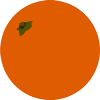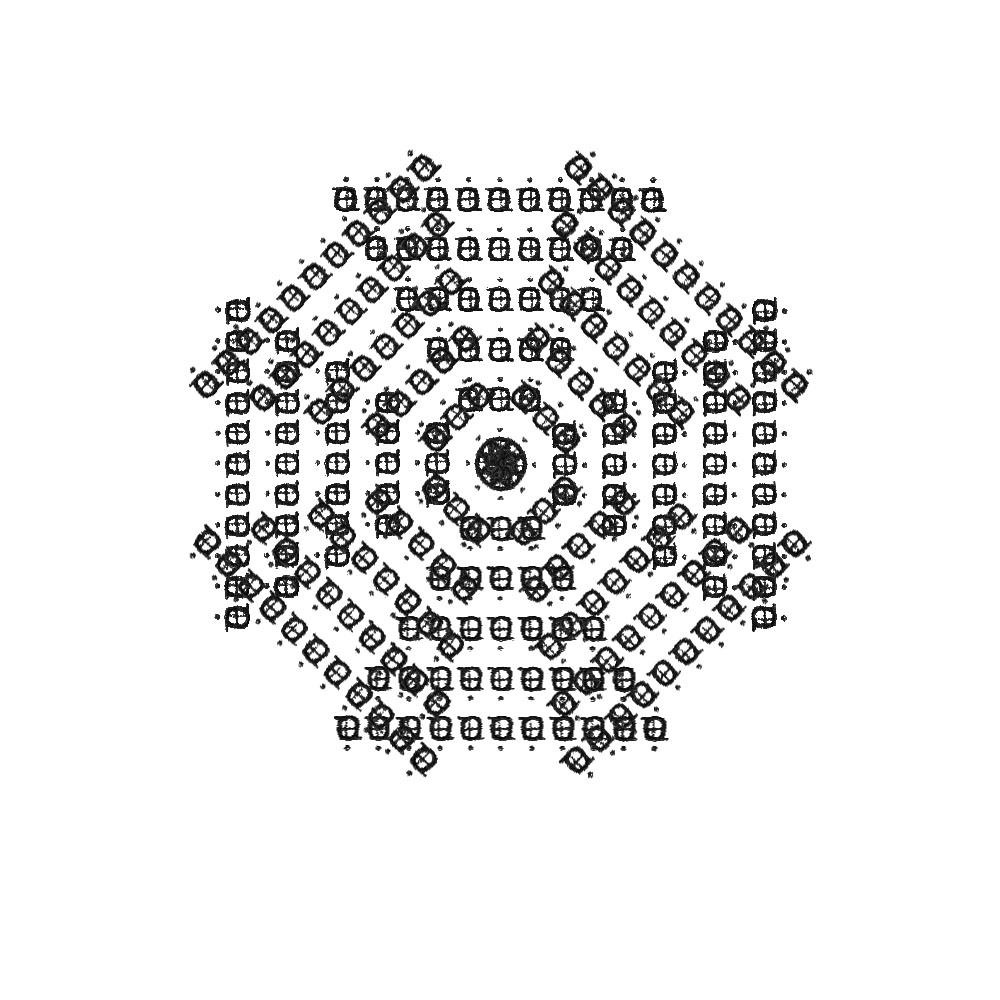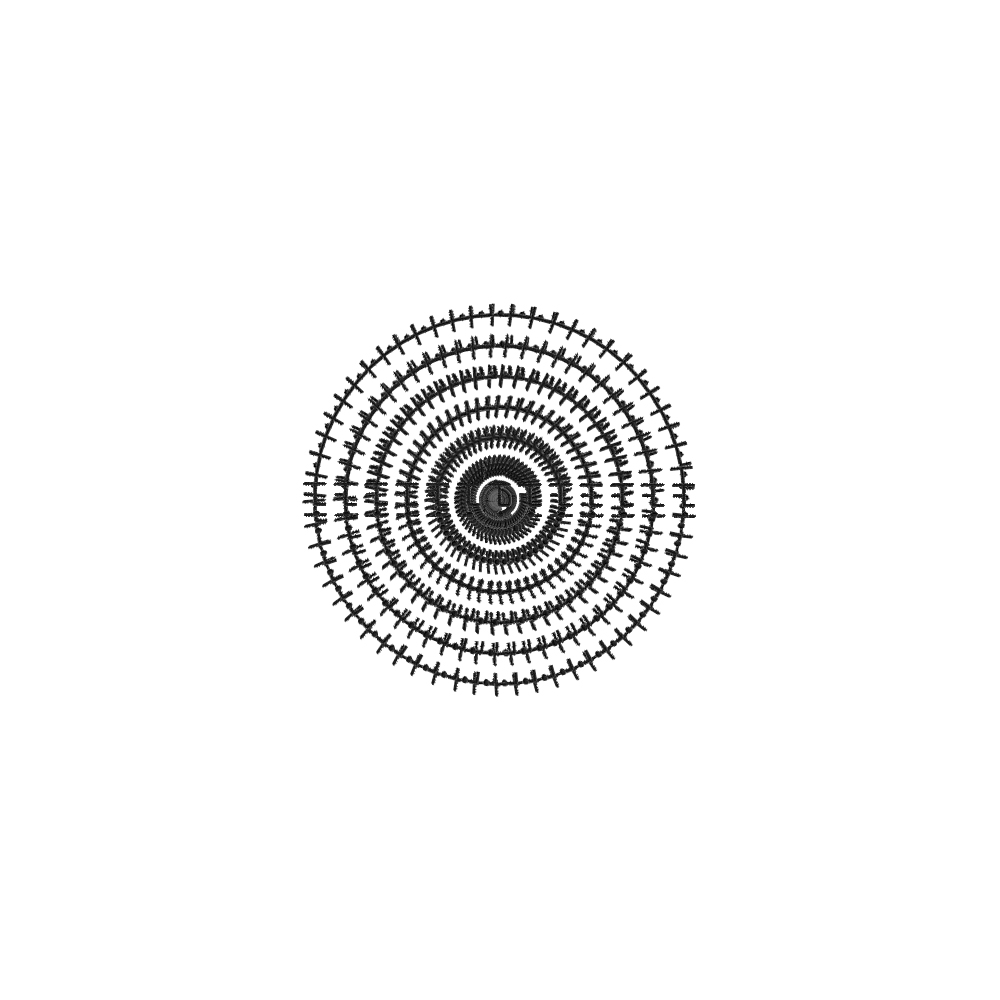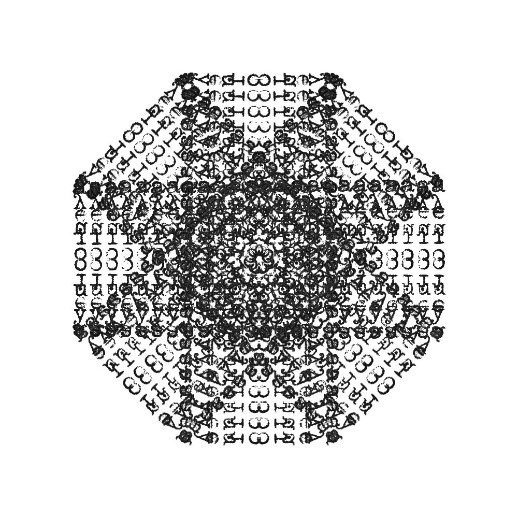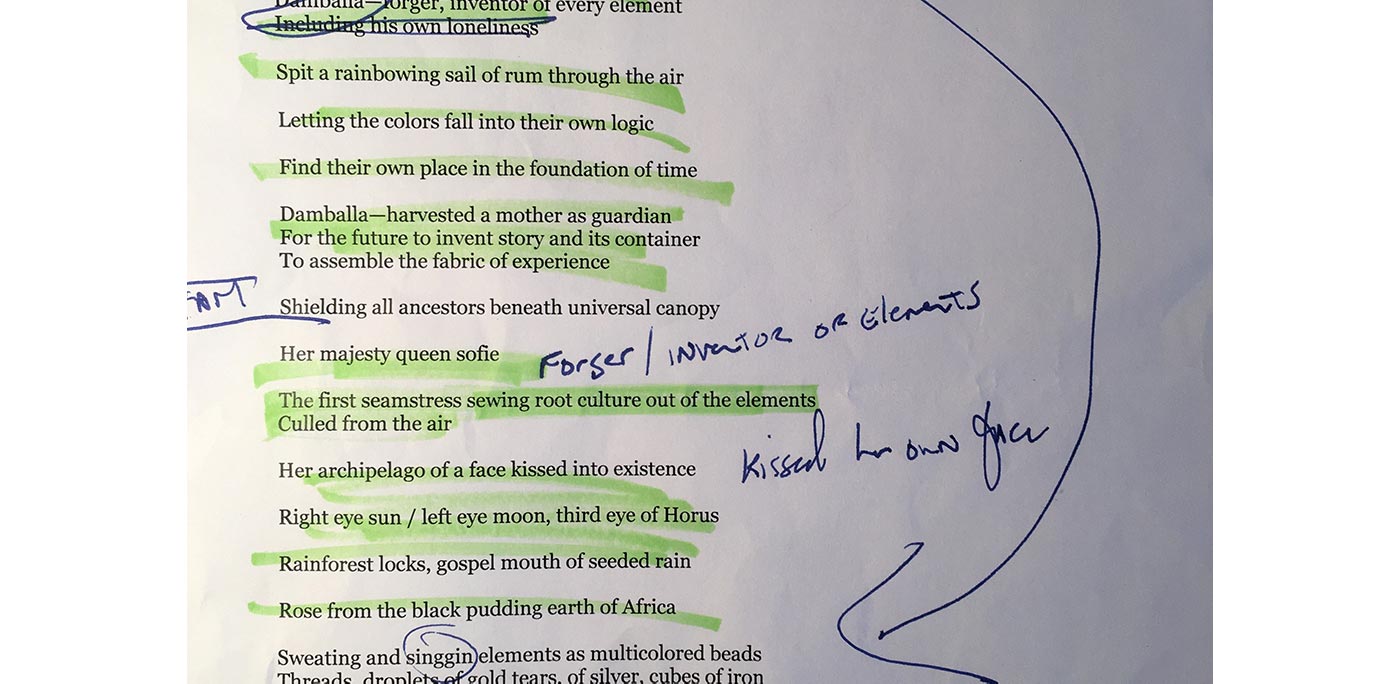Inter-
Dani Spinosa
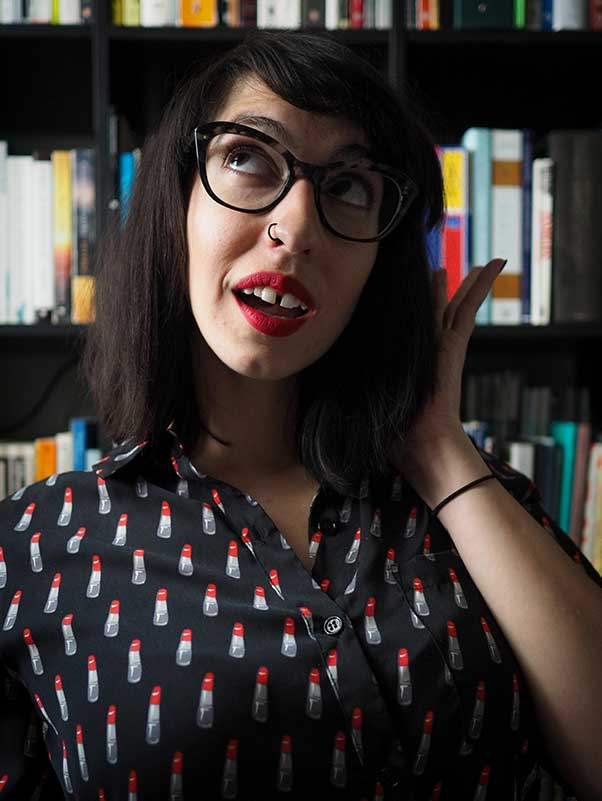
On Practice:
Do you write at the same time every day, in the same place? How would you describe your writing practice/s?
I write whenever I can. I am an adjunct professor working at two institutions in Southern Ontario—Sheridan College and York University—so much of my time is taken up with that work. But, when I do write, I write in several different locations in my home: my desk in my office upstairs where I keep my laptop as well as all three of my typewriters (an Olympia, a Smith-Corona, and a Clover), the dining room table where the air conditioner is, my back patio, or (where I sit right now) on my couch with my laptop on the coffee table while watching television (today, I’m Dying Up Here). Because most of my work starts on a typewriter, I have a hard time going out to a library or coffeeshop to write.
What do you do if you get stuck while writing a poem?
I like to leave myself notes on stickie notes or little pieces of paper throughout my house so that I’ll pass by the thoughts or questions I have been grappling with and keep thinking about them throughout the day. If you visit my home while I’m working on something, you’ll see little statements or questions all over my workstation. Two in my line of vision right now say: “Hestia: eldest child that everyone forgets” and “Why is a tapestry different from a quilt?”
Take a photograph of a page from your notebook or a screenshot of an electronic file of a poem you have been recently writing or revising.
I’m currently working with Kate Siklosi and Eric Schmaltz on a collaborative concrete poetry mural for the new English Department offices at York University in Toronto. Siklosi is a Toronto-based visual poet who writes primarily in Letraset. She has several chapbooks out right now, and a fabulous essay on fragility as feminist praxis published in Jacket2. Eric Schmaltz is a Toronto-based visual and sound poet whose debut collection, Surfaces, came out last year with Invisible Publishing. Here’s a piece from that project (two others are shared at the end of the Inter-):
On Poetry:
Is there something you once believed about poetry that you no longer hold true? What changed?
I used to be really interested in poetry that tried to eliminate the ego from the work, but the more I sit with that, the more I realize that removing the ego from the writing subject is only useful insofar as that ego is placed back into conversation with others.
What can/does poetry change?
Minds, mostly. Poetry makes you look at things. I often feel that this world makes people move quickly and pass things by. I think that the thing poetry changes most is requiring that people pay attention.
Is there something you now think you know about poetry that you wish you’d known a decade ago?
That it takes time. I used to be frustrated when a poem wouldn’t work when I began it, but I’ve learned to break my writing up into several steps that involve a lot of revision and looking newly at things. That’s why I have fallen in love with the process of writing poetry first on a typewriter, then scanning it in and altering it electronically.
On Influence & Inspiration:
What books are on your night stand, the back of the toilet, your desk?
Night stand: Elena Ferrante’s My Brilliant Friend. Back of the toilet: Sudoku and an Ikea catalogue. Desk: Salman Rushdie’s Haroun and the Sea of Stories, Luigi Pirandello’s Six Characters in Search of an Author, Tao Lin’s Taipei.
Which writer/s do you (re)read the most? What does the writing do for you upon return?
I have read more John Cage than anyone else in my life. Close seconds are Erin Moure and Susan Howe. I reread Moure most often. I have probably read Sheep’s Vigil By a Fervent Person more than any other text. It demands rereading, both because you see on second (or third or fourth) reading how much the language and the images develop as the collection progresses. I also always find something new, and I love how Moure adapts, alters, and transelates (Moure’s term for the elation of translating loosely and personally) Pessoa to be so much about where I live. I like the way that Moure is able to negotiate her discomfort with the lyric subject alongside a clear voice, and I look to her all the time as a way to do both.
Among the poets you most admire, who has influenced you the least? Why have you not been influenced by his/her/their work?
I really love reading Kurt Vonnegut, but with the exception of one poem where I meditate on his “granfalloon,” I don’t think my work has really been influenced by Vonnegut at all. I think we’re just doing two really different things. And, I don’t think anyone needs to do Vonnegut after Vonnegut. This doesn’t stop a lot of fiction writers from the last thirty years from trying to be Vonnegut, but Vonnegut already cornered that market, so...
Describe a moment from your life when you’ve been overcome by how beautiful something is.
About a week ago my sister had her first baby, the most perfect human being I’ve ever seen. She was so scared and strong and resilient and tired at the same time, and looking at her holding her new baby was absolutely the most beautiful thing I’ve ever seen. I think it was so beautiful because it was the most monumental and gorgeous thing that happened to our lives, but it is also so quotidian. The hallways in the hospital were filled with so many other families having their own beautiful, monumental moments. The whole experience was overwhelming, and now I look at this baby and feel how tremendous his potential is, and also how much he is just another human in a world filled to the brim with them.
On Teaching:
How would you describe poetry to a four-year-old? To the non-literary family ancestor you imagine as a great source of who you are?
Poetry is the place where the imaginary creatures you think can be real, but it’s also the place where you still have to clean your room and your nails.
What characteristics does your ideal poem possess?
As seems to be the theme of the day, my ideal poem is equal parts unfathomable majesty and shelf dust.
Do you teach poetry? If so, what are you trying to teach through poetry? What has poetry taught you?
I teach poetry as part of literary courses. I like to teach how reading poems can be enriched by understanding their social, cultural, and historical contexts. I like to remind students that we only ever receive content through form. I like to tell my students that everything in a poem is on purpose, but we’re never sure whose purpose or what that purpose is. I like to teach poetry as a place where readers are stronger than authors.
On Publishing & Themes Present/Future:
How has publishing your poems changed your writing practice, process, and product?
I think a lot more about how a poem should fit on a page now. I think a lot more about how really beautiful poems should make the page fit them. I haven’t quite mastered the latter yet, but I know that when I am publishing poems through the press I run with Kate Siklosi, Gap Riot Press , I listen to the poems and let the best of them dictate how that page would work.
Is there a poem you’ve always wanted to write but haven’t? If so, why are you waiting? What subjects, themes, forms, aesthetics, etc. do/will you explore in your work?
I always wanted to write a poem about Mary Vincent , a woman who survived an absolutely heinous rape and attempted murder. I can’t ever really bring myself to write her into a poem of mine because I don’t want to appropriate her terrible suffering for my work. But, I write to her often like an idol or a celebrity. My journals are filled with letters to Mary Vincent that I could never possibly send. Her story is some of the most powerful stuff I’ve ever heard. You can learn about Mary Vincent in her episode of the television show I Survived, which is available on YouTube.
Right now I’m working on a project that revisits my favourite women from Greek mythology that are stuck in their situations, and I read them through excerpts and images from old Playboy issues. They are concrete poems, but they are more text-based and more sensical than most of my writing before this project. I’ve been working on it for a long time.
On Oranges:
Oranges or apples? Why?
Granny smith apples, sliced, with peanut butter, and largely as a delicious reason to take too-large scoops of peanut butter.
About the Poet
Dani Spinosa is a poet of digital and print media. She teaches literature in Toronto where she lives with one great man and one mean cat. She can be found online at www.genericpronoun.com.
Inter-
James Cagney
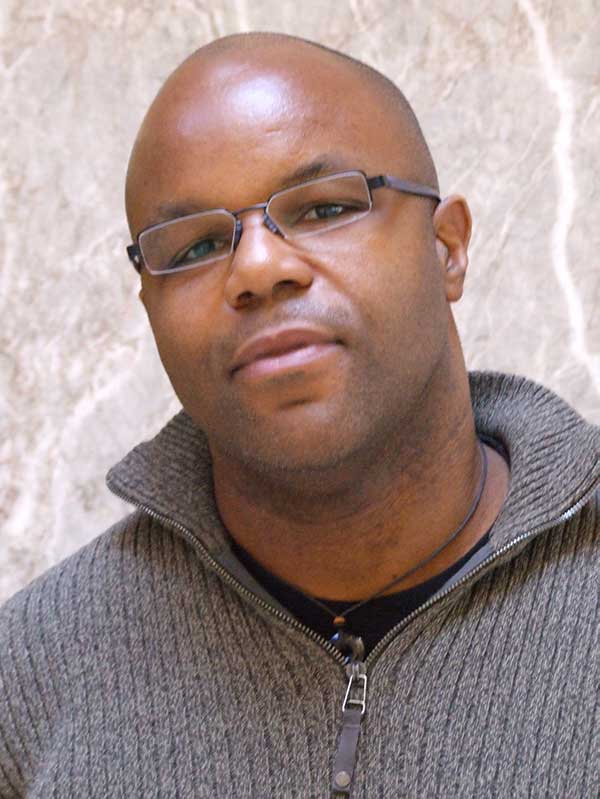
On Practice:
Do you write at the same time every day, in the same place? How would you describe your writing practice/s?
I can’t write every day. I’d like to. My day job is a distraction. The effort to be there and be present. Although I work at a firm which allows for some free time, it’s rarely comfortable enough there for me to think. I journal in brief daily, which I call Sentence Practice, but even that can be a struggle. It’s also distracting to work at home as I live in a small apartment and keep thinking, I should be cleaning or something. Since I am a morning person, I made an arrangement with myself to write Sundays. If Saturdays I need to run errands, shop, cook, sleep, decompress from the week, at least Sundays I can devote entirely to writing. A mile from my house is a coffee shop owned by an Ethiopian family. I go there when it opens, get a coffee and fresh croissant and write by hand. A laptop is also a distraction because internet, you know. So on a good day, I journal for about six pages, then try to edit or draft poems. I’m there three or four hours, then go home to type. Throughout the week, I’ll email myself drafts to play with and print at work when I find time.
What do you do if you get stuck while writing a poem?
Read. If my words stop flowing, then I consult with someone else’s. If I have an idea that’s shy about emerging, I’ll think, how might Jim Harrison say this? Or Rita Dove? Or Sharon Olds? Sometimes, I’ll take a walk or wash dishes. A physical activity I can do without much concentration, like digging in a garden, or sweeping, for example, is great because I can draft and turn over ideas while I get blood flowing and am engaged with something.
Take a photograph of a page from your notebook or a screenshot of an electronic file of a poem you have been recently writing or revising.
On Poetry:
Is there something you once believed about poetry that you no longer hold true? What changed?
That all poems have to rhyme or all poems are about nature. I assumed as much before I began really reading and writing and listening to poetry. Reading dead white men in my adolescence, I didn’t know you could use poems to talk about real things, like your life. I was introduced to poetry’s versatility when I started going to open mics and practicing writing and reading poetry.
What can/does poetry change?
I guess a good poem is like an alarm that wakes up something dormant within you. Even if what was in dormancy was just ignorance, not realizing one could say a particular thing or that a poem about X even existed.
Is there something you now think you know about poetry that you wish you’d known a decade ago?
To write shorter poems with more precision. My first attempts at writing poetry were too influenced by prose. I now know to allow myself to be more cryptic instead of concrete. Coming out of high school, the main writing style I practiced was journalism. So, my approach to writing was to pull from experience and get my facts right. My early poems, I’d overwrite a lot. Still do. My first workshop at Cave Canem, I was with former MFA students and current teachers and professors and published writers. I learned from them to pare down, be more exact, sharpen my scope. I recently took an older poem I was never completely happy with that was about 447 words and cut it down to 142. I learned it’s okay to not tell everything, to not cram every image that appears in my head into a poem.
On Influence & Inspiration:
What books are on your night stand, the back of the toilet, your desk?
I just finished Maggie Nelson’s Bluets and I’m surprised she only mentioned the Blues through Emmylou Harris. I’ll try to forgive that since her book is a tiny marvel. Her Mouth as Souvenir by Heather June Gibbons, which is stunning. I discovered and fell in love with the poetry of Hanif Abdurraqib and am finishing his book of essays on A Tribe Called Quest called Go Ahead in the Rain: Notes to A Tribe Called Quest. Mary Oliver is new to me and I’ve been digging her selected Devotions. Lucia Berlin’s Evening in Paradise. I was very lucky here in San Francisco to see some of her stories from A Manual For Cleaning Women staged verbatim by the theater group Word for Word. That was exciting because I love her stories desperately. I got Willie Perdomo’s book The Crazy Bunch after I took his manuscript workshop at VONA (Voices of Our Nation). His workshop was a huge help in shaping my book, encouraging me to finish it. His own book is incredible. It’s a movie. I regret loaning it out to my friend; I gotta buy another copy now.
Which writer/s do you (re)read the most? What does the writing do for you upon return?
I consult Jack Gilbert, Gary Soto, D.A. Powell, Audre Lorde, Terrence Hayes. I take inspiration from their turns of phrase, their visuals. The writers I want to be are Toni Morrison, Cormac McCarthy, and Elmore Leonard. Toni is easy to admire, obviously. I’ve found myself revisiting sections of Song of Solomon: the funeral scene, the hunting dogs. I’m committed to McCarthy and Leonard because they teach me dialogue. They both render conversation beautifully. McCarthy writes disturbing and gorgeous description better than anybody. Mostly, I’ll read a book, admire it and keep moving. I rarely reread anything. Thus far, the only book I’ve read twice is The Last Temptation of Christ by Nikos Kazantzakis. His writing is as good as poetry.
Among the poets you most admire, who has influenced you the least? Why have you not been influenced by his/her work?
Probably Richard Brautigan. His work is so rich and creative and funny, and I can’t get close to him. I can’t steal, I can’t mimic. I can only admire his writing—his tiny poems and short stories with the most brilliant closing lines. He’s one of those writers. I wish I could do a percentage of what he’s doing, but I don’t know what he’s doing. Him and Lydia Davis. I respect her micro, succinct stories, but I don’t know how to practice or even be satisfied by them. I talked about overwriting earlier, didn’t I?
Describe a moment from your life when you've been overcome by how beautiful something is.
What’s beautiful to me are cloud forms, water, flowers. Light. Tiny moments, really. I find a dog’s gait endlessly watchable. Trees, fabric, hair responding to wind. But to be overcome by how beautiful something is, I think of my experiences with art. The last few years I’ve worked with the Contemporary Jewish Museum and the Museum of The African Diaspora (MOAD), both in San Francisco, to write responsive poems to artwork in their galleries. I’ve tried to write like the paintings I admire. I saw an exhibit of Robert Rauschenberg’s work at the San Francisco MOMA. I really saw it in my chest. Rauschenberg’s work felt alive and vibrant. It was as if his canvasses and sculptures were little DNA samples that never stopped growing. I stood with some of his work and wondered: Is it possible to write like this? People tell me I do already, but I keep reaching farther and farther toward abstraction, away from logic and places, where as a poet, I feel most comfortable.
On Teaching:
How would you describe poetry to a four-year-old? To the non-literary family ancestor you imagine as a great source of who you are?
I have no better answer than a new meme I saw recently: “A poem is an egg with a horse in it.” I mean, there is no better answer. If that makes no sense to you, no matter your age, you need to stay away from poetry.
What characteristics does your ideal poem possess?
I don’t know. They’re all different, aren’t they? The poems I’ve written and the poems I wish I’d written. No two are alike nor do they ask the same of their readers. Williams’ The Red Wheelbarrow is as valuable to me as Marianne Moore’s An Octopus. Lucille Clifton’s won’t you celebrate with me is a prayer I didn’t realize I needed. That should be the first and last poem anyone needs to read. I’ve quoted it to death. All three of these poems are equally essential to me and yet they couldn’t be more different. Each has a different personality and different terrain. There’s no one recipe for cake, there’s no one way to write a poem. I’ve written a poem people have adored for years that took less than five minutes to finish. There are poems that took me the better part of a month to write. There are poems that felt spiritually dictated. There are poems I’ve written and loved, but people just stare at me blankly when I read them. There are poems that are direct journal entries, just describing what happened. And then there are poems that have specific forms. There are no standard characteristics. There are no universal truths for all successful poems.
Do you teach poetry? If so, what are you trying to teach through poetry? What has poetry taught you?
I don’t teach. I feel an outlier because of that. It was suggested to me when I was in my mid-to-late 20’s, but I think of teaching as a calling and I didn’t get that call. A couple of times I took workshops just to ask myself if I could do what their teachers were doing and realized I could. After all these years, I have the tools, the experience. I’ve led a couple of workshops and enjoyed the process. I’m open to leading more in the future. I’m certain I will. But I don’t pine to be a leader in the classroom. I think all my poetry peers are teachers. I deeply admire them for it and wish I had the fire and personality for it. But I’d rather attend their class than lead one.
On Publishing & Themes Present/Future:
How has publishing your poems changed your writing practice, process, and product?
It makes me insecure about my work. It makes me judge and devalue my poems. It makes me read my poem and think: Would you be more acceptable to the people here or over there? If a stranger or intern just picks you up off a table, will they see you? Do you have value beyond just to me? Is this poem sharp as the other poems they published or not as mediocre as the work they seem to like? I feel lucky to get poems published, but sometimes to just motivate myself to send them out takes more effort than I can muster.
Is there a poem you've always wanted to write but haven’t? If so, why are you waiting? What subjects, themes, forms, aesthetics, etc. do/will you explore in your work?
I keep thinking I should write about my name or about having an unusual name, but I haven’t found a good entry point. It is crazy to listen to a random podcast and have someone call my whole name. And, I’m a junior. It was strange after my dad died standing there reading my name on a tombstone. Yet and still, it feels navel-gazey, narcissistic to write about my name. It’s funny, I don’t have problems writing about being adopted or struggling with intimacy or my failures, but writing about my name feels weird. It’s too close for me to see clearly. I want to and should, but my subconscious is a little suspicious of this idea. Nothing feels close to sparking. Maybe someday.
As far as subjects, themes, it’s hard to say. Poems come and I can neither stop them nor demand they appear. For a while, I thought I was done writing about my father. But I was not done writing about my father. I don’t want to write politically about what’s happening in this country (US), but those poems burst through me anyway. Nasty, sticky and angry. I’m not always happy to see them, but there they are. Every day I observe what’s around me, I listen and try to nudge myself to put words down. Sometimes it’s obvious and words come. Sometimes it’s a struggle. Sometimes a thing is just what it is and doesn’t need a poem for it to be seen. Sometimes just being is enough.
On Oranges:
Oranges or apples? Why?
Because I detest the memory of my grandfather’s and his generation’s ubiquitous bag of circus peanut candy, between that and those big, useless, gummy orange fruit slices, those things put me off orange candy for life. And no, if given an option, I would never choose an orange-based candy. An Orange Dream-Sickle is divine, but a rich, orange-based candy or pastry would not be my first choice. However, I would take an apple-infused anything without thinking. In fact, there was a notebook I had a while ago made from recycled apple peels, and I really liked that thing. So, yeah, I adore fresh orange juice and covet my bottle of orange cleanser and de-greaser, but, if you make me choose: Apple.
About the Poet
James Cagney is from Oakland, CA. He has appeared at venues throughout the San Francisco Bay Area, including KALW.ORG and San Francisco Chronicle. He is a two-time contributor to The Maynard. His first book, Black Steel Magnolias in the Hour of Chaos Theory is available from Nomadicpress.org. Visit TheDirtyRat.blog
